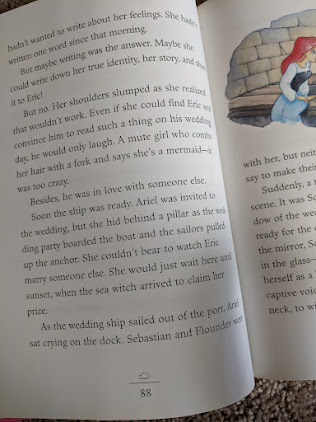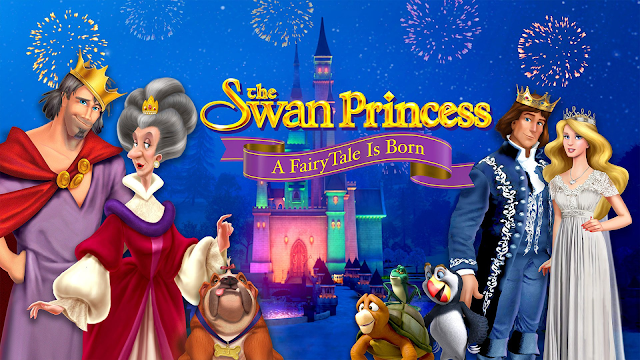One of the most common complaints about Disney's The Little Mermaid that the new remake tried to "fix" is that after Ariel demonstrated she could write by signing her name on Ursula's contract, she never used this method to communicate with Eric when she was mute. In an interview on TikTok, director Rob Marshall said that in order to fix this "plot hole," he "wanted to eliminate the whole idea that she can write at all." Instead of signing a scroll, she plucks a scale from her scale to seal the deal with Ursula, giving her no other way to reveal her identity when she meets Prince Eric. The popular YouTube account HISHE (How It Should Have Ended) played with this idea in their recent video, in which Ariel scrawls her entire story to Eric in the sand the moment she meets him on the beach. Even novel adaptations of the fairy tale have incorporated this method of communication for the voiceless mermaid. Is it true that no one who worked on the original 1989 movie thought of this? The answer may surprise you.
As some of you may recall, one of the newest
items in my collection is
The Little Mermaid: The Full Film Script from Canterbury Classics. This is more than just the screenplay of the movie. It contains concept art, interviews, production details, and, most notably, the original story treatment that was written by
Ron Clements in 1985. For those of you who are unfamiliar with
screenwriting, a treatment is a broad two-page summary of a movie that is used as a jumping off point to outline the finer details that will eventually evolve into a hundred-or-so-page script. The original treatment for a film is rarely the exact same story used in the movie by the time a screenplay is completed. Expanding upon each scene for the full-length script inevitably creates story problems that need to be fixed by adjusting various elements of the plot. Therefore, it's no surprise that the ending that was summarized in this treatment was vastly different from the one we saw in the completed film. However, one particular element of it stood out to me that I've never seen anyone use as a defense of this popular plot hole argument.
In the original treatment, Ariel writes a letter to Prince Eric that becomes a major plot point leading up to the film's climax, which was a lot more similar to
The Swan Princess or
Beauty and the Beast than the ending that we ended up with. Some defenders of this plot hole may still argue that Ariel waited too long to write the letter, but if you consider that she only had three days to get Eric to fall in love with her and spent the first day finding her bearings as a human and adjusting to life in Eric's castle, it makes sense that she wouldn't have gotten a chance to sit down, find a writing utensil, and begin penning a letter until the second night, which was when Vanessa entranced Eric. Not only that, but does anyone honestly believes that Eric finding a letter would have been a more exciting climax than the one we got? All Eric needed to figure out that Ariel was the one who saved him was to listen to her voice one time. After she transforms back into a mermaid, reading the letter seems like an extraneous detail that detracts from the action of movie's riveting third act. According to the book, the thrilling climax in which Ursula grows into a giant monster and creates a huge storm was due to
Jeffrey Katzenberg's complaint that the original ending wasn't exciting enough. Even though I'll never forgive him for trying to cut "Part of Your World," he at least had the good sense to realize a letter wasn't very cinematic.
This treatment wasn't the only time that a letter had been incorporated into the Disney version of
"The Little Mermaid." The 2003 coffee table book
Once Upon a Princess featured diary entries from various Disney Princess characters and included a passage in which Ariel was considering writing a letter to Eric that revealed her identity the day she learned he was going to marry Vanessa, like in the original treatment. However, she decides against it because writing that she was a mermaid under a spell just didn't seem very believable compared to seeing it for himself when the spell broke. And you know what? I think she was right. Imagine if she wrote that to him the first day he met her on the beach. He'd probably think she swallowed a little too much seawater. Plus, giving Eric the opportunity to spend quality time with Ariel without knowing she was under a spell gave him the chance to fall in love with her organically instead of trying to help her fulfill a deal. This is something that was emphasized even more in the live-action remake, regardless of whether or not she had been able to write. Ursula clearly states that Eric must give Ariel "not just any kiss," but "the kiss of true love," which is something that could have only happened after he spent time with her, and not as a result of reading a letter.
What do you think? Does Ariel's ability to write create a plot hole, or would it have no major impact on the story? I personally don't think it makes much of a difference because Eric still needed to fall in love with her for who she was and not just because she was the girl who saved him. He already suspected her true identity several times upon meeting her, and the way that it is ultimately confirmed for him is far more cinematic than reading a letter would have been. Having Ariel sign a contract made more sense in the animated film because it showed that she was aware of and agreed to Ursula's terms, unlike the remake, which makes her forget the terms of the deal right after the spell is cast.














Comments